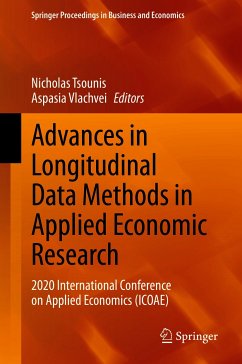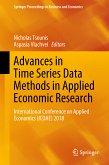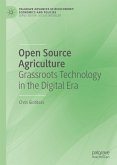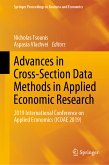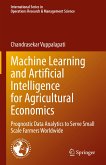Advances in Longitudinal Data Methods in Applied Economic Research (eBook, PDF)
2020 International Conference on Applied Economics (ICOAE)
Redaktion: Tsounis, Nicholas; Vlachvei, Aspasia
193,95 €
193,95 €
inkl. MwSt.
Sofort per Download lieferbar

97 °P sammeln
193,95 €
Als Download kaufen

193,95 €
inkl. MwSt.
Sofort per Download lieferbar

97 °P sammeln
Jetzt verschenken
Alle Infos zum eBook verschenken
193,95 €
inkl. MwSt.
Sofort per Download lieferbar
Alle Infos zum eBook verschenken

97 °P sammeln
Advances in Longitudinal Data Methods in Applied Economic Research (eBook, PDF)
2020 International Conference on Applied Economics (ICOAE)
Redaktion: Tsounis, Nicholas; Vlachvei, Aspasia
- Format: PDF
- Merkliste
- Auf die Merkliste
- Bewerten Bewerten
- Teilen
- Produkt teilen
- Produkterinnerung
- Produkterinnerung

Bitte loggen Sie sich zunächst in Ihr Kundenkonto ein oder registrieren Sie sich bei
bücher.de, um das eBook-Abo tolino select nutzen zu können.
Hier können Sie sich einloggen
Hier können Sie sich einloggen
Sie sind bereits eingeloggt. Klicken Sie auf 2. tolino select Abo, um fortzufahren.

Bitte loggen Sie sich zunächst in Ihr Kundenkonto ein oder registrieren Sie sich bei bücher.de, um das eBook-Abo tolino select nutzen zu können.
This volume presents new methods and applications in longitudinal data estimation methodology in applied economic. Featuring selected papers from the 2020 the International Conference on Applied Economics (ICOAE 2020) held virtually due to the corona virus pandemic, this book examines interdisciplinary topics such as financial economics, international economics, agricultural economics, marketing and management. Country specific case studies are also featured.
- Geräte: PC
- ohne Kopierschutz
- eBook Hilfe
- Größe: 9.38MB
Andere Kunden interessierten sich auch für
![Advances in Time Series Data Methods in Applied Economic Research (eBook, PDF) Advances in Time Series Data Methods in Applied Economic Research (eBook, PDF)]() Advances in Time Series Data Methods in Applied Economic Research (eBook, PDF)161,95 €
Advances in Time Series Data Methods in Applied Economic Research (eBook, PDF)161,95 €![Advances in Panel Data Analysis in Applied Economic Research (eBook, PDF) Advances in Panel Data Analysis in Applied Economic Research (eBook, PDF)]() Advances in Panel Data Analysis in Applied Economic Research (eBook, PDF)113,95 €
Advances in Panel Data Analysis in Applied Economic Research (eBook, PDF)113,95 €![Open Source Agriculture (eBook, PDF) Open Source Agriculture (eBook, PDF)]() Chris GiotitsasOpen Source Agriculture (eBook, PDF)40,95 €
Chris GiotitsasOpen Source Agriculture (eBook, PDF)40,95 €![Advances in Cross-Section Data Methods in Applied Economic Research (eBook, PDF) Advances in Cross-Section Data Methods in Applied Economic Research (eBook, PDF)]() Advances in Cross-Section Data Methods in Applied Economic Research (eBook, PDF)113,95 €
Advances in Cross-Section Data Methods in Applied Economic Research (eBook, PDF)113,95 €![Machine Learning and Artificial Intelligence for Agricultural Economics (eBook, PDF) Machine Learning and Artificial Intelligence for Agricultural Economics (eBook, PDF)]() Chandrasekar VuppalapatiMachine Learning and Artificial Intelligence for Agricultural Economics (eBook, PDF)121,95 €
Chandrasekar VuppalapatiMachine Learning and Artificial Intelligence for Agricultural Economics (eBook, PDF)121,95 €![Technology Meets Flowers (eBook, PDF) Technology Meets Flowers (eBook, PDF)]() Eric van HeckTechnology Meets Flowers (eBook, PDF)27,95 €
Eric van HeckTechnology Meets Flowers (eBook, PDF)27,95 €![Work in Early Modern Italy, 1500-1800 (eBook, PDF) Work in Early Modern Italy, 1500-1800 (eBook, PDF)]() Luca MocarelliWork in Early Modern Italy, 1500-1800 (eBook, PDF)73,95 €
Luca MocarelliWork in Early Modern Italy, 1500-1800 (eBook, PDF)73,95 €-
-
-
This volume presents new methods and applications in longitudinal data estimation methodology in applied economic. Featuring selected papers from the 2020 the International Conference on Applied Economics (ICOAE 2020) held virtually due to the corona virus pandemic, this book examines interdisciplinary topics such as financial economics, international economics, agricultural economics, marketing and management. Country specific case studies are also featured.
Dieser Download kann aus rechtlichen Gründen nur mit Rechnungsadresse in A, B, BG, CY, CZ, D, DK, EW, E, FIN, F, GR, HR, H, IRL, I, LT, L, LR, M, NL, PL, P, R, S, SLO, SK ausgeliefert werden.
Produktdetails
- Produktdetails
- Verlag: Springer International Publishing
- Seitenzahl: 552
- Erscheinungstermin: 31. März 2021
- Englisch
- ISBN-13: 9783030639709
- Artikelnr.: 61386798
- Verlag: Springer International Publishing
- Seitenzahl: 552
- Erscheinungstermin: 31. März 2021
- Englisch
- ISBN-13: 9783030639709
- Artikelnr.: 61386798
- Herstellerkennzeichnung Die Herstellerinformationen sind derzeit nicht verfügbar.
Nicholas Tsounis is a Professor of Economics at the Department of Economics, University of Western Macedonia (Greece) and an adjunct faculty member at the Hellenic Open University (Greece). His research interests are on applied international economics, economic integration and applied microeconomics. He has published many articles in international scientific periodicals and conferences proceedings as well as books. He is the co-founder of the International Conference on Applied Economics (ICOAE). Aspasia Vlachvei is a Professor of Marketing at the Department of Economics, University of Western Macedonia (Greece) and an adjunct faculty member at the Hellenic Open University. Her research interests focus on international marketing strategies, competitiveness, wine tourism and wine marketing, e-marketing, social media. She is the co-founder of the International Conference on Applied Economics (ICOAE).
Chapter 1: Forecasting the South African Financial Cycle: A Linear and Non-linear Approach.- Chapter 2: From clubs to communities. From tourists to international friends.- Chapter 3: Measuring Dynamic Capabilities-Based Synergies in M&A Deals with Real Options: Amazon's Acquisition of Whole Food.- Chapter 4: Raising rivals' costs when the downstream firms compete in Stackelberg fashion.- Chapter 5: Comparing five generational cohorts on their sustainable food consumption patterns: Recommendations for improvement through marketing communication.- Chapter 6: The Effect of Budgetary Policies on the Economy Activity in Algeria: A Markov Switching Approach.- Chapter 7: Structure of Bond Pension Funds during Decreasing Yield Curves.- Chapter 8: Extracting Common Factors from Liquidity Measures with Principal Component Analysis on the Polish Stock Market.- Chapter 9: The Mechanism of Political Budget Cycles in Greece.- Chapter 10: Examination Of Business Interest In Level Of Complexity Of Facial Biometric Technology Implementation In Slovakia.- Chapter 11: Innovation And Sales Growth Among Heterogeneous Albanian Firms - A Quantile Approach.- Chapter 12: Quantitative analysis of inequalities at ICT sector in Visegrad countries.- Chapter 13: Does government spending cause investment - A Panel Data Analysis.- Chapter 14: An exploratory study of fans' motivation in Albanian football championship.- Chapter 15: Accounting knowledge of regional economic university students.- Chapter 16: Corporate governance disclosure in Slovak banks.- Chapter 17: Implementation of Critical Reflection Analysis in Process of Teaching and Learning which Focused on Developing Critical Thinking Skills.- Chapter 18: Agreement between methods of measurement of poverty rates.- Chapter 19: The role of strategic agility and economic environment's friendliness-hostility in explaining success of Polish SMEs.- Chapter 20: Macroeconomic determinants of NPLs using an extended sample and Dominance Analysis.- Chapter 21: Aspects of financial accounting and managerial accounting outputs in connection with the decision-making processes of accounting units.- Chapter 22: Movies performance: empirical evidence from Italy.- Chapter 23: Patterns of knowledge creation in European regions: an analysis by the phases of the EU-enlargements.- Chapter 24: Influence of Economic Sanctions: Empirical Evidence for Iran and Russia.- Chapter 25: Corporate Governance and its association with audit opinion: the case of Greece.- Chapter 26: CO2 Emissions, Energy Consumption, Economic Growth, Trade and Urbanization in Greece.- Chapter 27: Does the Time Driven ABC method apply in a construction company.- Chapter 28: Economic crisis predictors revisited in preparation for the COVID-19 aftermath.- Chapter 29: Should Market Makers Hedge with Realised or Implied Volatility.- Chapter 30: Stress Testing Option Sensitivities in a Stochastic Market.- Chapter 31: Firm performances and the onset of shocks in India.- Chapter 32: The Neoclassical Approach for measuring Total Factor Productivity: the case of the Greek Economy.- Chapter 33: Consumers' Motives for visiting Social media pages and Social media Advertisements.- Chapter 34: Factors affecting E-Marketing adoption and implementation in food firms: An empirical investigation of Greek food and beverage firms.- Chapter 35: An application of Differential Equations on Anthropogenic Climate Change.- Author Index.
Chapter 1: Forecasting the South African Financial Cycle: A Linear and Non-linear Approach.- Chapter 2: From clubs to communities. From tourists to international friends.- Chapter 3: Measuring Dynamic Capabilities-Based Synergies in M&A Deals with Real Options: Amazon's Acquisition of Whole Food.- Chapter 4: Raising rivals' costs when the downstream firms compete in Stackelberg fashion.- Chapter 5: Comparing five generational cohorts on their sustainable food consumption patterns: Recommendations for improvement through marketing communication.- Chapter 6: The Effect of Budgetary Policies on the Economy Activity in Algeria: A Markov Switching Approach.- Chapter 7: Structure of Bond Pension Funds during Decreasing Yield Curves.- Chapter 8: Extracting Common Factors from Liquidity Measures with Principal Component Analysis on the Polish Stock Market.- Chapter 9: The Mechanism of Political Budget Cycles in Greece.- Chapter 10: Examination Of Business Interest In Level Of Complexity Of Facial Biometric Technology Implementation In Slovakia.- Chapter 11: Innovation And Sales Growth Among Heterogeneous Albanian Firms - A Quantile Approach.- Chapter 12: Quantitative analysis of inequalities at ICT sector in Visegrad countries.- Chapter 13: Does government spending cause investment - A Panel Data Analysis.- Chapter 14: An exploratory study of fans' motivation in Albanian football championship.- Chapter 15: Accounting knowledge of regional economic university students.- Chapter 16: Corporate governance disclosure in Slovak banks.- Chapter 17: Implementation of Critical Reflection Analysis in Process of Teaching and Learning which Focused on Developing Critical Thinking Skills.- Chapter 18: Agreement between methods of measurement of poverty rates.- Chapter 19: The role of strategic agility and economic environment's friendliness-hostility in explaining success of Polish SMEs.- Chapter 20: Macroeconomic determinants of NPLs using an extended sample and Dominance Analysis.- Chapter 21: Aspects of financial accounting and managerial accounting outputs in connection with the decision-making processes of accounting units.- Chapter 22: Movies performance: empirical evidence from Italy.- Chapter 23: Patterns of knowledge creation in European regions: an analysis by the phases of the EU-enlargements.- Chapter 24: Influence of Economic Sanctions: Empirical Evidence for Iran and Russia.- Chapter 25: Corporate Governance and its association with audit opinion: the case of Greece.- Chapter 26: CO2 Emissions, Energy Consumption, Economic Growth, Trade and Urbanization in Greece.- Chapter 27: Does the Time Driven ABC method apply in a construction company.- Chapter 28: Economic crisis predictors revisited in preparation for the COVID-19 aftermath.- Chapter 29: Should Market Makers Hedge with Realised or Implied Volatility.- Chapter 30: Stress Testing Option Sensitivities in a Stochastic Market.- Chapter 31: Firm performances and the onset of shocks in India.- Chapter 32: The Neoclassical Approach for measuring Total Factor Productivity: the case of the Greek Economy.- Chapter 33: Consumers' Motives for visiting Social media pages and Social media Advertisements.- Chapter 34: Factors affecting E-Marketing adoption and implementation in food firms: An empirical investigation of Greek food and beverage firms.- Chapter 35: An application of Differential Equations on Anthropogenic Climate Change.- Author Index.
